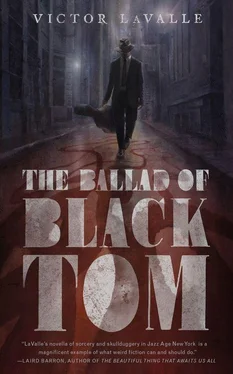Victor Lavalle
The Ballad of Black Tom
For H. P. Lovecraft, with all my conflicted feelings
People who move to New York always make the same mistake. They can’t see the place. This is true of Manhattan, but even the outer boroughs, too, be it Flushing Meadows in Queens or Red Hook in Brooklyn. They come looking for magic, whether evil or good, and nothing will convince them it isn’t here. This wasn’t all bad, though. Some New Yorkers had learned how to make a living from this error in thinking. Charles Thomas Tester for one.
The morning of most importance began with a trip from Charles’s apartment in Harlem. He’d been hired to make a delivery to a house out in Queens. He shared the crib in Harlem with his ailing father, Otis, a man who’d been dying ever since his wife of twenty-one years expired. They’d had one child, Charles Thomas, and even though he was twenty and exactly the age for independence, he played the role of dutiful son. Charles worked to support his dying dad. He hustled to provide food and shelter and a little extra to lay on a number from time to time. God knows he didn’t make any more than that.
A little after 8:00 a.m., he left the apartment in his gray flannel suit; the slacks were cuffed but scuffed and the sleeves conspicuously short. Fine fabric, but frayed. This gave Charles a certain look. Like a gentleman without a gentleman’s bank account. He picked the brown leather brogues with nicked toes. Then the seal-brown trooper hat instead of the fedora. The trooper hat’s brim showed its age and wear, and this was good for his hustle, too. Last, he took the guitar case, essential to complete the look. He left the guitar itself at home with his bedridden father. Inside he carried only a yellow book, not much larger than a pack of cards.
As Charles Thomas Tester left the apartment on West 144th Street, he heard his father plucking at the strings in the back bedroom. The old man could spend half a day playing that instrument and singing along to the radio at his bedside. Charles expected to be back home before midday, his guitar case empty and his wallet full.
“Who’s that writing?” his father sang, voice hoarse but the more lovely for it. “I said who’s that writing?”
Before leaving, Charles sang back the last line of the chorus. “John the Revelator.” He was embarrassed by his voice, not tuneful at all, at least when compared with his dad’s.
In the apartment Charles Thomas Tester went by Charles, but on the street everyone knew him as Tommy. Tommy Tester, always carrying a guitar case. This wasn’t because he aspired to be a musician; in fact he could barely remember a handful of songs and his singing voice might be described, kindly, as wobbly. His father, who’d made a living as a bricklayer, and his mother, who’d spent her life working as a domestic, had loved music. Dad played guitar and Mother could really stroll on a piano. It was only natural that Tommy Tester ended up drawn to performing, the only tragedy being that he lacked talent. He thought of himself as an entertainer. There were others who would have called him a scammer, a swindler, a con, but he never thought of himself this way. No good charlatan ever did.
In the clothes he’d picked, he sure looked the part of the dazzling, down-and-out musician. He was a man who drew notice and enjoyed it. He walked to the train station as if he were on his way to play a rent party alongside Willie “The Lion” Smith. And Tommy had played with Willie’s band once. After a single song Willie threw Tommy out. And yet Tommy toted that guitar case like the businessmen proudly carrying their briefcases off to work now. The streets of Harlem had gone haywire in 1924, with blacks arriving from the South and the West Indies. A crowded part of the city found itself with more folks to accommodate. Tommy Tester enjoyed all this just fine. Walking through Harlem first thing in the morning was like being a single drop of blood inside an enormous body that was waking up. Brick and mortar, elevated train tracks, and miles of underground pipe, this city lived; day and night it thrived.
Tommy took up more room than most because of the guitar case. At the 143rd Street entrance he had to lift the case over his head while climbing the stairs to the elevated track. The little yellow book inside thumped but didn’t weigh much. He rode all the way down to 57th Street and there transferred for the Roosevelt Avenue Corona Line of the BMT. It was his second time going out to Queens, the first being when he’d taken the special job that would be completed today.
The farther Tommy Tester rode into Queens the more conspicuous he became. Far fewer Negroes lived in Flushing than in Harlem. Tommy bumped his hat slightly lower on his head. The conductor entered the car twice, and both times he stopped to make conversation with Tommy. Once to ask if he was a musician, knocking the guitar case as if it were his own, and the second time to ask if Tommy had missed his stop. The other passengers feigned disinterest even as Tommy saw them listening for his replies. Tommy kept the answers simple: “Yes, sir, I play guitar” and “No, sir, got a couple more stops still.” Becoming unremarkable, invisible, compliant — these were useful tricks for a black man in an all-white neighborhood. Survival techniques. At the last stop, Main Street, Tommy Tester got off with all the others — Irish and German immigrants mostly — and made his way down to street level. A long walk from here.
The whole way Tommy marveled at the broad streets and garden apartments. Though the borough had grown, modernized greatly since its former days as Dutch and British farmland, to a boy like Tommy, raised in Harlem, all this appeared rustic and bewilderingly open. The open arms of the natural world worried him as much as the white people, both so alien to him. When he passed whites on the street, he kept his gaze down and his shoulders soft. Men from Harlem were known for their strut, a lion’s stride, but out here he hid it away. He was surveyed but never stopped. His foot-shuffling disguise held up fine. And finally, amid the blocks and blocks of newly built garden apartments, Tommy Tester found his destination.
A private home, small and nearly lost in a copse of trees, the rest of the block taken up by a mortuary. The private place grew like a tumor on the house of the dead. Tommy Tester turned up the walkway and didn’t even have to knock. Before he’d climbed the three steps, the front door cracked open. A tall, gaunt woman stood in the doorway, half in shadows. Ma Att. That was the name he had for her, the only one she answered to. She’d hired him like this. On this doorstep, through a half-open door. Word had traveled to Harlem that she needed help and he was the type of man who could acquire what she needed. Summoned to her door and given a job without being invited in. The same would happen now. He understood, or could at least guess, at the reason. What would the neighbors say if this woman had Negroes coming freely into her home?
Tommy undid the latch of the guitar case and held it open. Ma Att leaned forward so her head peeked out into the daylight. Inside lay the book, no larger than the palm of Tommy’s hand. Its front and back covers were sallow yellow. Three words had been etched on both sides. Zig Zag Zig. Tommy didn’t know what the words meant, nor did he care to know. He hadn’t read this book, never even touched it with his bare hands. He’d been hired to transport the little yellow book, and that was all he’d done. He’d been the right man for this task, in part, because he knew he shouldn’t do any more than that. A good hustler isn’t curious. A good hustler only wants his pay.
Читать дальше












